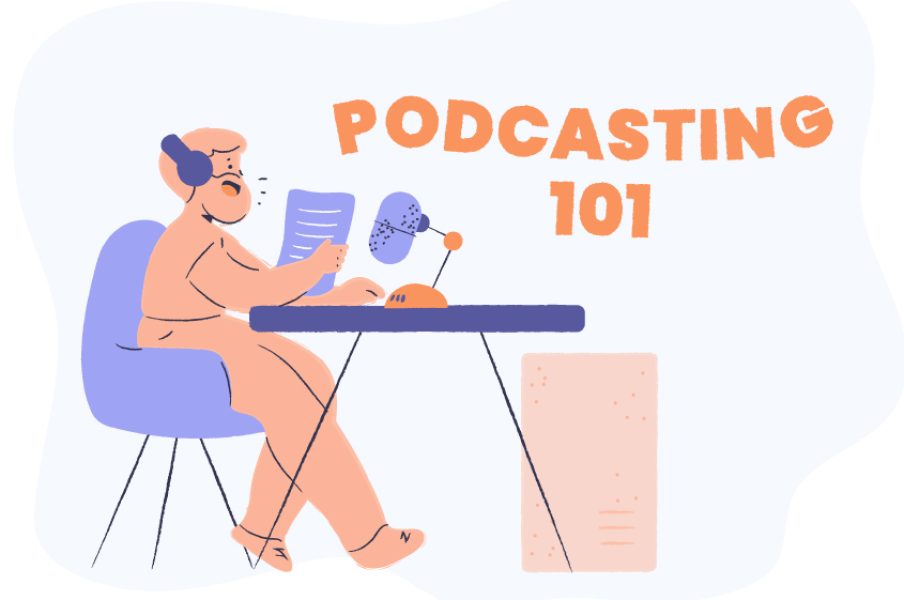North Americans have a hunger for long-form discussion, uninterrupted by commercial breaks, and available on demand. In the past 10 years, the podcast format grew from obscurity to dominating audio and video platforms. 75% of Americans are familiar with podcasting, over half have tuned in, and listenership continues to snowball.
The desire to listen is coupled with an influx of new podcasters. As of March 2021, there are over 47 million available podcast episodes. The number of new shows shouldn’t deter those interested in starting a podcast. Listenership is growing, and the amount of quality pods is far fewer than the total volume.
To stand out from the pack, follow these tips on how to start a podcast we have learned over the years. Being prepared and learning from others’ mistakes provides a new show with a tremendous advantage for success.
Take the Time to Prepare
Your podcast needs to offer value to an audience with millions of available options. Before you click record, you need a clear plan. Your new show must have a purpose with a unique value proposition. Hours should be dedicated to properly determining the show’s approach and finding that balance between niche and the growth potential.
Decide on Your Podcast Format, Style, and Identity
Successful podcasts have a consistent feel every episode. Fans of the Joe Rogan Experience know they will get Joe, his producer, and a guest (maybe two) for about 3 hours. These decisions need to be made before your first episode.
A podcast also needs a great name and logo that is going to make listeners stop scrolling and check out your show. Having a couple of well-produced logos, a captivating description, and cover art that you are proud of will create a great first impression and allow you to easily plug your show when the time comes.
Research
Establishing a niche that is broad enough to gain a following but not too oversaturated takes research. Find what is missing from the current top-ranking podcasts in your desired niche.
A podcast about US history is too broad. There are already hundreds of shows with loyal followers. However, telling US history through the lens of Presidential scandals may have more potential to capture an audience.
Outline Your Strategy to Monetize
Research and establishing your show’s identity are more important than a monetization plan before your first episode. It is still a good idea to think about how you are going to make money in the future. Having a few thoughts about monetizing down the road is important. However, don’t spend too much time on this step. Opportunities arise for those who can consistently produce solid content.
Get Your Podcast Equipment in Order
Creating a podcast is hard enough. Doing it with inadequate equipment is impossible. If you don’t have a producer with experience, practice. You don’t want the production to get in the way of recording.
Don’t Bore Your Audience
Mundane conversations aren’t shared. There is an art to keeping people entertained for hours by simply talking. The best podcasters make it look or sound easy, but it’s not. Seriously think about this when establishing your podcast’s format.
Successful podcasts transcend the medium. Clips from the show get circulated on social, in blogs, and even on traditional media platforms. To do this, you don’t necessarily have to controversial, but it is the path with the least resistance.
Choose a Great Podcast Hosting Platform
Many new podcasters are attracted to a free platform. Once they get going, they run out of storage and their platform requires a subscription. Other platforms limit the podcatchers you can integrate with.
Do the research. Finding a hosting platform that allows you to grow is crucial. Compare bandwidth, integration with directories, marketing tools, and storage space.
Spreaker is a great place to start your podcast hosting journey. They offer a variety of plans depending on the number of features and customization you require. Plans range from $0 and up, with their free plan being the perfect gateway into the podcasting world. The all-in-one platform is easy to use for newcomers, and once your podcast baby begins to gain traction, you can easily update your plan to experience more of their useful features.
Plan Your First Episodes
Please don’t make the mistake of putting all your efforts into your first episode and releasing it without a plan for the future. If you are focusing on current events, this can be challenging; there are still measures to take to make the process as seamless as possible.
Pre-Record
Having multiple subsequent episodes ready to be released takes a lot of pressure off a new podcasting team. If you aren’t relying on today’s hot button issue, like The Controversial President’s Pod mentioned earlier, pre-record as many episodes as possible and release them in quick succession.
Use the first couple of episodes to introduce the listeners to the show. Communicate the podcast’s identity, style, and format to potential loyal listeners.
Create Reusable Content
Releasing content each week or multiple times a week is hard work. Creating reusable content such as slogans, music, and segments makes for a seamless production process. Having cohesion gives the podcast brand identity and provides listeners with a sense of familiarity.
The most successful podcast on Patreon, as of December 2020, was Chapo Trap House. The left-wing political show featuring former Bernie aids has always used an iconic Gucci Mane sample for their theme song. Great theme music and recognizable transitions give loyal fans comfort each time they tune in. Chapo Trap House’s opening song has taken on a life of its own, generating parodies, memes, and even guitar cover videos.
Call-to-Action
As the episode comes to a close, give the listeners something to do. You could tell them to check out a sponsor, subscribe on YouTube, or leave a rating.
Plan Your Podcast Content Calendar
Record, mix, and upload future episodes as far in advance as possible to maintain a consistent schedule. Treat your podcast as a business. Create deadlines, projections, and goals to keep the content flowing and evolving.
Release and Marketing
Putting out your show isn’t enough to become successful. Most of us don’t have millions of followers and can’t get away with simply putting out content. Your marketing strategy should be planned and orchestrated the same way as production. Using project management software is a great way to stay organized and collaborate within your podcasting team.
Submit Your Podcast
If you picked a solid podcasting host, this shouldn’t be difficult. You want the furthest reach possible, be sure to release the show on all the major platforms.
Podcast Marketing
Start with a website. Your podcast website needs at minimum, a Home, About, Episodes, Contact, and Resource pages. The Episodes page should host your transcripts along with a podcast player. Give visitors a place to find your affiliate links and recommended products on the Resources page. Plug the website’s URL in your episodes so the page can generate affiliate income.
Social media handles are also vital to driving listeners to your podcast. Plan posts out ahead of time, so you aren’t scrambling to piece together posts every couple of days. Use relevant hashtags, follow similar accounts in your niche, and engage with your audience. The most important part of growing a new social account is to consistently post engaging content. Your podcast should fuel the social media pages with clips and relevant topics. Post content that your followers will want to share.
SEO is another way to drive traffic to your website and podcast. Target relevant keywords and optimize blog posts to rank for key phrases in your niche. Again, consistent content is vital.
Many podcasts use other pods for advertising. These shows find a successful podcast that isn’t a direct competition but has an audience that is likely to show interest in their show. For example, the Jordan Harbinger Show buys ads from The Lex Fridman Show. Both podcasts have massive audiences. Fridman’s show is centred around artificial intelligence and computer science, Harbinger’s podcast is more motivational. Both shows do one-on-one interviews and are about the same length. It’s a good bet that a Lex Fridman listener would also enjoy the content from Jordan Harbinger. They have similar shows; both hosts have in-depth conversations with a guest.
Media Kit
Once your podcast starts gaining attention, you want to be ready. Have at least a one-page PDF prepared to send to inquiring advertisers, other podcasts, and potential guests. Outline details about the show and give examples of your best-performing episodes.
You can also use your media kit to generate PR. A good PR campaign will earn valuable backlinks that will give your website a boost in Google rankings and deliver organic traffic to your podcast.
Keep Pumping out Content
Most podcasts fail because they aren’t ready for the grind that is required for success. You can count on at least a year before you start seeing results. Most podcasts take 2-3 years before they start making money.
It is ok if your mom is the only listener for the first couple of months. Websites, social media accounts, and podcasts all take time to get off the ground. Feeding the almighty algorithms with consistently fresh content is the only way to generate traffic. It’s a grind, but if you can make it past the first couple of years, you will have the potential to generate an income from talking. What could be more rewarding!?
Starting a podcast takes preparation, a clear plan, marketing, and the ability to consistently create content that is continually improving. Use these tips to give yourself the best chance to be successful. Good luck!
Interested in our business insights? Subscribe to email alerts and you’ll never miss an article.










